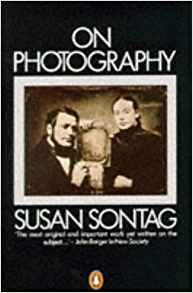Take a photo of a barcode or cover
challenging
informative
inspiring
reflective
medium-paced
inspiring
reflective
medium-paced
informative
inspiring
reflective
medium-paced
Meandering observations about photography (and reality, art, time, power), unmistakably of the 1970s but still pertinent today. I cannot help but wonder what Sontag would have made of phone cameras, social media, AI.
My biggest issue with this was Sontag's style of presenting her ideas as undifferentiated, generalised statements. Indefinite pronouns abound, only rarely does the author herself appear. Who is this "one," or this "we" she writes of? Often that imprecision made me ultimately disagree with her arguments, though I can still see their merits.
hopeful
informative
inspiring
reflective
medium-paced
Thought-provoking and till this time extremely relevant. Sontag makes a case against photography by citing the very use of photography (why do it?). Some of the passages she wrote almost 50 years ago evoke 21st-century photography on social media, especially on Instagram and how masses are participating in charades that are supposed to make them feel better about life and about themselves. Book explores the historical use of camera and how it has taken over our lives and created a dual identity -- lived experience and lensed experience, and how due to the intended purpose of photography, lensed experience has taken over user's life and created an artificial-lonely- miserable life for them in a capitalist society where everything is being commodified, including beauty, photo documented experience, and almost everything we can think of. It's a must-read, even if you have zero interest in photography.
The reasons I loved this book were also what ultimately led to me DNFing it—it reads like critical theory. I love critical theory, but boy can it become incessantly whiny and pessimistic. The essays have a lot in common, and after around essay #2 I felt my interest seriously waning. I tried pushing through regardless, but ultimately just didn’t have the last 80 pages in me.
On this subject, Susan Sontag is absolutely ruthless. And I think her personal feelings got in the way of objectivity (for instance, she makes it known that she believes writing is a particularly faithful, authentic art form). However, so much of what she wrote was right on the money, or at least true in many cases. Much in this essay collection was certainly thought-provoking.
I’d recommend reading the first essay and being satisfied with yourself after that. Maybe the last couple essays are super good and I quit too early, but I’d say reading one or two of her essays on photography is probably sufficient to understand 80% of her argument on the matter.
On this subject, Susan Sontag is absolutely ruthless. And I think her personal feelings got in the way of objectivity (for instance, she makes it known that she believes writing is a particularly faithful, authentic art form). However, so much of what she wrote was right on the money, or at least true in many cases. Much in this essay collection was certainly thought-provoking.
I’d recommend reading the first essay and being satisfied with yourself after that. Maybe the last couple essays are super good and I quit too early, but I’d say reading one or two of her essays on photography is probably sufficient to understand 80% of her argument on the matter.
informative
inspiring
reflective
medium-paced
A surprisingly entertaining read!
challenging
informative
reflective
medium-paced







